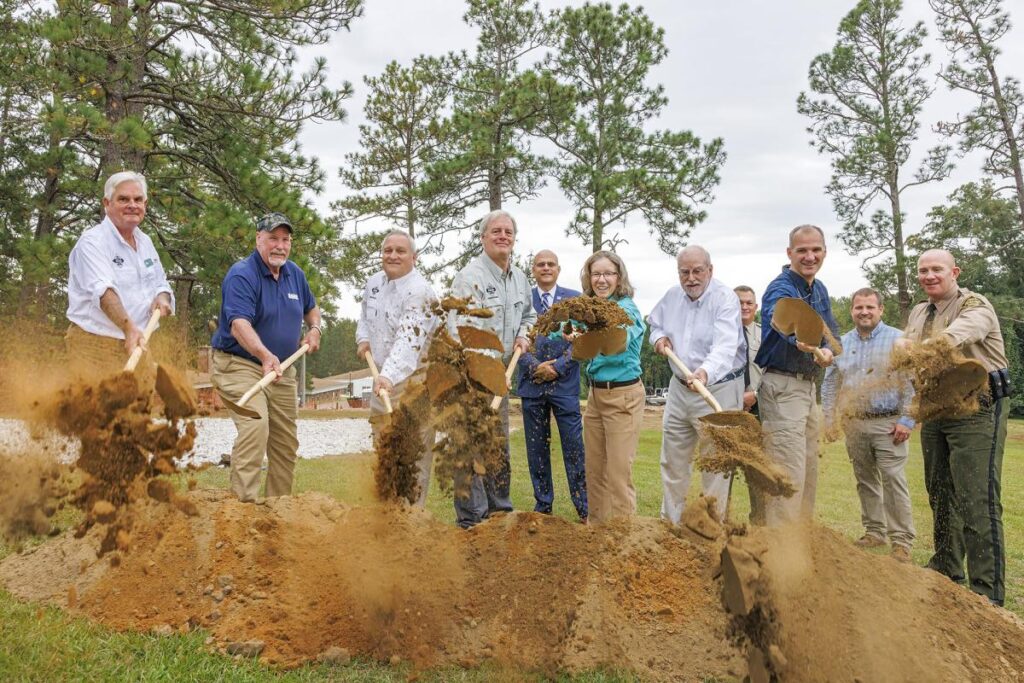(L-R, first row): Wildlife Commissioners Tom Haislip, Steve Wyndham, Monty Crump, Jim Ruffin, Kelly Davis and Thomas Fonville; Wildlife Commission Executive Director Cameron Ingram; and Wildlife Enforcement Colonel Ben Meyer. (L-R, back row): Matthew Rebuck, director of Samarcand Training Academy; Wildlife Enforcement Major Mark Dutton; and N.C. Rep. Ben Moss. (Jonathon Gruenke/NCWRC photo)
The North Carolina Wildlife Resources Commission (NCWRC) broke ground Oct. 6 on a $10 million law enforcement training facility that will cement the agency’s presence at the Department of Public Safety (DPS) Samarcand Training Academy in Moore County.
“This modern training facility will greatly increase our capacity to develop new officers to the highest standards as well as maintain the professional skills required through training of the current and future workforce,” explained NCWRC’s Colonel Ben Meyer in a statement. “Through this partnership, DPS and NCWRC will continue to better develop and train law enforcement officers who will serve the citizens of North Carolina.”
The state’s wildlife resources agency has been training its recruits at Samarcand through a lease agreement with DPS since 2021. The current training complex includes a firearms training center with two ranges, a range house, a use-of-force firearms simulator and an obstacle and conditioning course.
NCWRC plans to expand the campus to include a 20,000-sq.-ft., multi-floor structure with housing to accommodate approximately 50 agency personnel and a 1,200-sq.-ft. classroom and a tactical training room.
Construction is set to begin before the end of October just as the state’s number of wildlife law enforcement staff increases by an additional 16 officers. Earlier in the month, the North Carolina General Assembly approved funding for the new officers — the first increase in officer staff in 46 years. Currently, NCWRC Law Enforcement has 208 wildlife officer positions.
“Adding 16 new officer positions to our Wildlife Law Enforcement Division, along with the extra capacity to train officers, will allow us to better protect and conserve our state’s wildlife, habitats, and natural resources,” noted Cameron Ingram, NCWRC’s executive director. “It will allow us to keep our public safe on waterways and lands that everyone enjoys.”
Since the last increase in wildlife law enforcement staff in 1977, North Carolina’s population has increased 87 percent, annual vessel registrations have increased an additional 194,000 to nearly 371,000, and annual hunting, fishing, and trapping licenses sales have gone up by more than 200 percent.
NCWRC expects the new training facility to be completed by August 2024.
NCDOT Awards First Contract to Finish Raleigh’s Outer Loop
Construction of the final leg of the Outer Loop around the North Carolina capital city will begin as soon as next year, according to a recent report in the Raleigh News & Observer.
The state Department of Transportation (NCDOT) and the N.C. Turnpike Authority have awarded the first of two construction contracts to complete N.C. Highway 540, also known as the Triangle Expressway, between Interstate 40 and Interstate 87. The agencies expect to award the second contract later this year, putting the highway on schedule to open in 2028, according to NCDOT.
When that occurs, the six-lane Triangle Expressway toll road will be complete from Research Triangle Park (RTP) across southern Wake County to Knightdale, on the eastern side of Raleigh. N.C. 540 also will connect with I-540 to finish the Outer Loop across the northern part of the county.
Construction on an 18-mi. section of N.C. 540 across southern Wake began in 2019. When it opens in 2024, it will extend the expressway from N.C. 55 in Apex to a massive interchange at I-40 and U.S. 70 near the Johnston County line.
NCDOT has broken the final 10-mi. section into two projects.
The first contract, awarded in late September to a joint venture of Flatiron and Raleigh-based Fred Smith Co., is to build six miles of road from south of Rock Quarry Road to I-87 at a cost of $450 million, the News & Observer noted. It added that the second contract for the remaining 4 mi. is expected to total about $350 million.
Just a few years ago, the state transportation agency did not expect to have the money to begin work on the final leg of the loop until 2029 or later.
But the Turnpike Authority was able to get a single environmental permit for the road from Apex to Knightdale, allowing NCDOT to get started with utility work, such as moving a Duke Energy power line and a Federal Aviation Administration tower, authority spokesperson Logen Hodges told the Raleigh news source.
That pre-construction work, coupled with strong local support and expected toll revenues, helped the project move up NCDOT’s list of priorities, Hodges added.
Some version of a loop highway around Raleigh has appeared on planning maps since the 1980s. Construction on the first segment, known as the Northern Wake Expressway, began in 1992 and eventually arced across North Raleigh connecting U.S. 64 in Knightdale with I-40 near RTP.
Read the full article here











